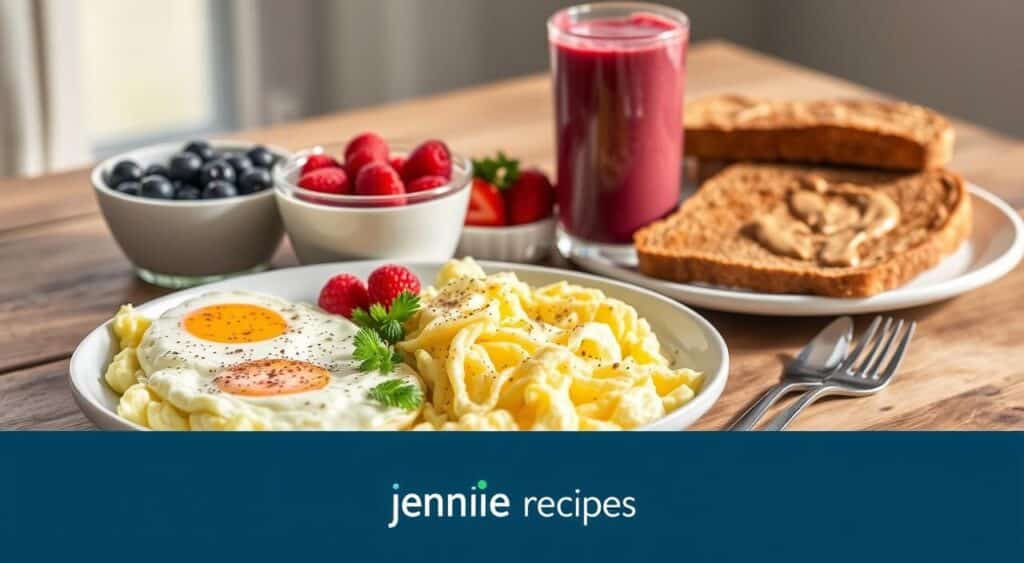Jump to:
Estimated reading time: 11 minutes
Table of contents
Protein is key for building and keeping muscles and tissues healthy. It also keeps you full in the morning and balances your blood sugar. This article will show you how to get 30g of protein for breakfast. You’ll find tasty high-protein options, from eggs to smoothies, to start your day right.
Key Takeaways
- Protein-rich breakfasts can provide 20-25% of daily protein needs
- Many recipes offer 15-25g of protein per serving
- Diverse protein sources like eggs, yogurt, and protein shakes can help reach 30g of protein
- High-protein breakfasts support muscle maintenance, metabolism, and satiety
- Strategies like combining foods and meal prepping can make 30g protein breakfasts easier
Introduction
Breakfast is key for adding protein to your day. High-quality protein in the morning helps keep muscles strong, boosts metabolism, and controls hunger and cravings. This article will show you tasty and healthy high-protein breakfasts to hit your 30g protein goal.
Protein is essential for many body functions, like cell repair and hormone balance. Adding protein-rich foods to your breakfast boosts your health and well-being.
“Eating a high-protein breakfast is a simple and effective way to improve your diet and support a healthy lifestyle.”
We’ll discuss why 30g of protein at breakfast is important. Then, we’ll share top high-protein breakfast ideas. Plus, we’ll give tips on making breakfast fit your diet and taste. This guide will help you fuel up for the day, whether you’re building muscle, managing weight, or just need energy.
Why Getting 30g Protein for Breakfast Is Important
Protein is key for keeping muscles and tissues healthy. It also boosts your morning energy and focus. Plus, it makes you feel full, cutting down on snacks later.
The Role of Protein in Muscle Maintenance
Your body needs protein to build and fix muscle fibers. Adding 30g of protein to breakfast meets a big part of your daily needs. This supports muscle growth and prevents wasting, especially with age.
How Protein Boosts Metabolism in the Morning
Protein takes more energy to digest than carbs or fats. Starting with a protein-rich breakfast boosts your metabolism. This helps you burn more calories in the morning.
Protein’s Impact on Satiety and Reducing Cravings
Protein keeps you full and satisfied, reducing hunger and snacking. Adding 30g of protein to breakfast makes you feel fuller longer. This helps stick to a healthy diet and avoid bad cravings.
“Research shows starting with 30 to 39 grams of protein at breakfast can cut lunchtime calories by 175 for 34 healthy women.”
Focus on 30g of protein at breakfast for lasting energy and muscle health. It also helps control hunger and supports weight management, sports performance, and overall health.
Top High-Protein Breakfast Ideas
Eggs, Greek yogurt, and protein-packed smoothies are great for a protein-rich morning meal. They help you feel full and energized until lunchtime.
Eggs and Egg-Based Dishes for Protein
Eggs are a classic breakfast choice, packed with protein. Each egg has about 6 grams of protein. Try frittatas, omelets, or egg bites for 15-25 grams of protein.
Greek Yogurt with Toppings for Added Protein
Greek yogurt is another excellent high-protein breakfast option. It can have up to 24 grams of protein. Add nuts, seeds, or fruit for more protein and nutrients.
Smoothies Packed with Protein Powder and Superfoods
Make a protein-rich smoothie with protein powder, Greek yogurt, milk, and superfoods like chia seeds or spinach. It can have 15-20 grams of protein. These smoothies are quick and nutritious.
| High-Protein Breakfast Idea | Protein Content |
|---|---|
| Eggs (1 egg) | 6 grams |
| Greek Yogurt Parfait | 24 grams |
| Protein-Packed Waffles | 20-24 grams |
| Smoked Salmon Toast | 21 grams |
| Whey Protein Smoothie | 15-20 grams |
Choose from eggs, Greek yogurt parfaits, or smoothies for a protein-packed breakfast. There are many options to start your day right.
How to Get 30g Protein for Breakfast Without Eggs
If you don’t like or can’t have eggs, there are still many ways to get 30g of protein for breakfast. You can use dairy-free and vegan protein sources like tofu, tempeh, and plant-based protein powders. These can be added to breakfast dishes and smoothies.
High-protein cereals made with quinoa, amaranth, or chia seeds are also great. Oatmeal made with protein powder is another filling option.
Dairy-Free and Vegan Protein Sources
- Tofu (18g protein per 1/2 cup)
- Tempeh (33.7g protein per cup)
- Canned tuna (40g protein per can)
- Sardines (18g protein per 1/2 cup serving)
- Lentils (18g protein per cup, cooked)
- Black beans (7g protein per 1/2 cup serving)
Plant-Based Protein Powders for Breakfast
Plant-based protein powders can help you reach your 30g protein goal. Look for powders made from pea, hemp, rice, or a blend of plant-based proteins. You can add them to smoothies, oatmeal, or even baked goods for a protein boost.
High-Protein Cereal Options and Alternatives
| Breakfast Item | Protein Content |
|---|---|
| Quinoa cereal | 6g protein per 1 cup cooked |
| Amaranth cereal | 9g protein per 1 cup cooked |
| Chia seed cereal | 4.7g protein per 2 tbsp |
| Oatmeal made with protein powder | 14g protein per 1 cup cooked |
By focusing on dairy-free and plant-based protein sources, you can easily achieve your 30g protein goal for breakfast without eggs. Try different combinations to find the perfect high-protein breakfast no eggs that fits your taste and dietary needs.
Combining Foods to Reach 30g Protein at Breakfast
Getting 30g of protein at breakfast might seem hard. But, mixing different protein-rich foods makes it easy. Pair whole grains, nuts, seeds, and various proteins for a balanced meal.
Pairing Whole Grains with Protein-Rich Foods
Begin with whole grains like oats or quinoa. Add eggs, Greek yogurt, or tofu for protein. This combo is filling and nutritious, giving you energy for the day.
Adding Protein-Rich Nuts and Seeds to Breakfast Bowls
Top your breakfast with nuts, seeds, or nut butters. Almonds, walnuts, chia seeds, and flaxseeds boost protein. They add crunch and healthy fats, keeping you full and energized.
Combining Meat, Dairy, and Plant Proteins for Optimal Results
For a balanced breakfast, mix eggs, Greek yogurt, and tofu. This mix gives you all essential amino acids. It makes your breakfast delicious and nutritious.
| Protein-Rich Breakfast Combinations | Protein Content (grams) |
|---|---|
| Whole Grain Oatmeal with Eggs and Nuts | 30g |
| Greek Yogurt with Berries, Chia Seeds, and Peanut Butter | 28g |
| Quinoa Bowl with Tofu, Spinach, and Avocado | 27g |
| Whole Wheat Toast with Salmon and Sliced Almonds | 26g |
| Veggie Omelet with Whole Grain Bread and Turkey Bacon | 30g |
By mixing whole grains, protein-rich foods, and healthy fats, you can make a 30g protein breakfast. Try different combinations to find what you like best.
How to Add Protein to Your Breakfast on a Busy Morning
Mornings can be hectic, but you don’t have to skip protein. There are easy ways to get 30g of protein at breakfast, even when you’re in a rush.
Pre-Made High-Protein Breakfast Options
For busy days, try pre-made high-protein breakfasts like breakfast sandwiches, burritos, and protein muffins. These are quick, packed with protein, and easy to take on the go.
Quick and Easy Protein-Packed Recipes to Make Ahead
Even with just a few minutes, you can prep protein-rich breakfasts. Try making breakfast casseroles, overnight oats, or protein waffles ahead of time. Then, just reheat them for a quick, protein-packed meal.
Using Protein Bars and Ready-to-Drink Shakes for a Quick Fix
When time is really tight, protein bars and shakes are great. Choose ones with at least 20g of protein per serving to meet your daily needs.

“Each serving of the protein waffles contains 30g of protein, which is a significant portion of the recommended daily intake for protein for an average individual.”
With a bit of planning, you can add 30g of protein to your busy mornings. Choose from pre-made items, make-ahead recipes, or quick supplements. There are many ways to start your day with the protein you need.
How to Customize a Protein-Rich Breakfast for Your Diet
Whether you’re on a low-carb, vegetarian, vegan, or keto diet, you can make a high-protein breakfast fit your needs. Use a variety of protein-rich foods to hit your 30g protein goal. This way, you can start your day with a nutritious meal.
Low-Carb, High-Protein Breakfast Ideas
For a low-carb diet, eggs are a top choice. Try low-carb high-protein breakfast dishes like crustless quiche, frittatas, or scrambled eggs with cheese and veggies. Cottage cheese and protein smoothies with low-carb high-protein breakfast ingredients like nut butters and leafy greens are also good.
High-Protein Breakfast for Vegetarians and Vegans
Vegetarians and vegans can use plant-based proteins. Try vegetarian high-protein breakfast foods like tofu, tempeh, protein-rich nut butters, and high-protein plant-based powders. Add whole grains, avocado, and nutrient-dense fruits and veggies for a balanced vegan high-protein breakfast.
Keto-Friendly Breakfasts with 30g Protein
On a keto high-protein breakfast plan, choose high-fat proteins like bacon, sausage, and cheese. Add low-carb veggies and healthy fats. Egg dishes, chia pudding with nut butter, and protein-packed smoothies are also keto high-protein breakfast options.
Customizing your breakfast to fit your diet helps fuel your body with the right nutrients. This way, you can start your day off right.
“Incorporating complete and incomplete protein sources in meals can help in achieving daily protein goals.”
How Much Protein Do You Actually Need at Breakfast?
The right amount of protein for breakfast changes based on your age, gender, and activity level. Most adults need 20-30g of protein in the morning. But, if you’re very active or have special dietary needs, you might need more or less.
Understanding Protein Requirements Based on Activity Levels
The Australian government says women up to 70 should eat at least 46g of protein daily. If you’re 70 or older, aim for 57g to keep muscles strong. Studies show eating at least 30g of protein at each meal helps with weight loss and building muscle.
Why 30g Protein Might Be Ideal for Some, But Not All
Protein has 4 calories per gram, so 30g is about 120 calories. Different foods offer different proteins, with animal sources often being complete proteins. For example, a 150g salmon has about 30g of protein. An 85g can of tuna in springwater or brine has 25g.
The Role of Protein Distribution Throughout the Day
It’s good to spread out your protein intake all day, not just at one meal. Aim for 30g of protein at each meal to help with weight loss or muscle gain. This keeps your muscles strong and supports your metabolism all day.
“Protein provides 4 calories per gram, meaning that 30 grams of protein contain roughly 120 calories.”

Frequently Asked Questions
How can I get 30g of protein for breakfast?
To get 30g of protein for breakfast, you can combine high-protein foods like eggs, Greek yogurt, cottage cheese, and protein shakes. For example, a breakfast of 3 eggs (18g), a serving of Greek yogurt (10g), and a handful of almonds (5g) will hit the mark.
What are some high-protein breakfast combinations?
A few high-protein breakfast combinations include scrambled eggs with turkey sausage, a smoothie with protein powder and peanut butter, or overnight oats with Greek yogurt and chia seeds. These meals easily reach 30g of protein.
Can I use protein powder to reach 30g of protein at breakfast?
Yes, adding a scoop of protein powder (typically 20-25g of protein) to a smoothie or oats, combined with other foods like milk or nut butter, can help you reach 30g of protein for breakfast.
Are plant-based options available for a 30g protein breakfast?
Yes, you can reach 30g of protein with plant-based options by combining foods like tofu scramble, plant-based protein powder, soy milk, and seeds. A tofu scramble with avocado and a protein smoothie is an easy plant-based option.
Conclusion
Getting 30g of protein at breakfast is doable and offers many benefits. It helps keep muscles strong, boosts your metabolism, and keeps you feeling full. You can make tasty and healthy breakfasts by mixing high-protein foods and drinks.
Try adding quinoa flakes, eggs, and dairy-free yogurt to your breakfast. These are all high in protein. Also, adding foods like strawberries can make your breakfast even better. They’re full of antioxidants and fiber.
It’s all about finding the right mix of protein-rich foods that you like. This way, you can easily hit your 30g protein target at breakfast. Eating protein-rich meals helps keep your muscles strong, gives you more energy, and keeps you satisfied in the morning.






